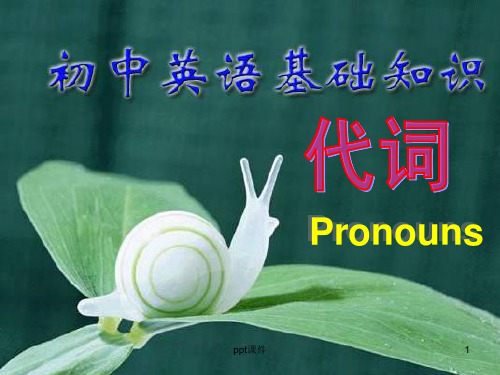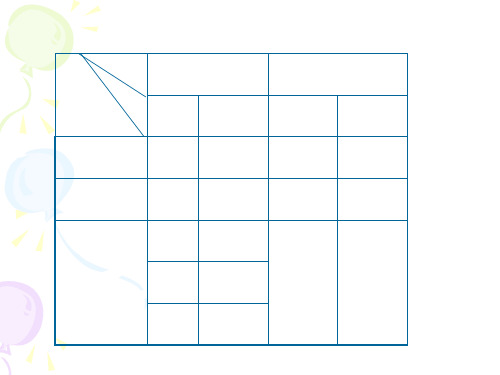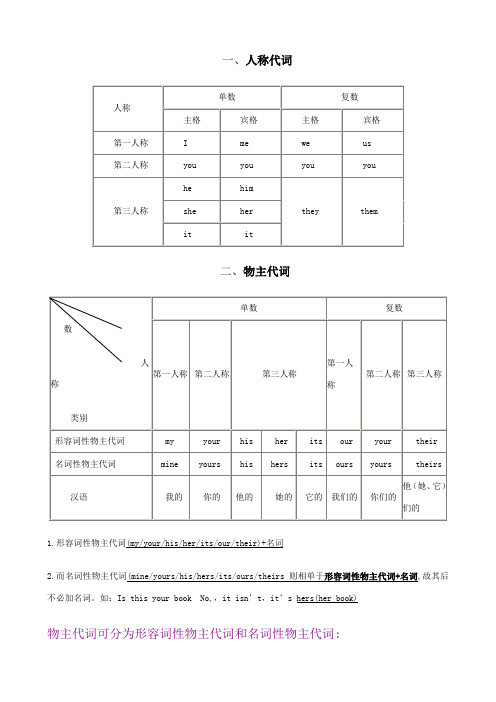英语中的主格宾格和形容词性物主代词表格ppt课件
初中英语语法—代词 ppt课件

Internet . A. go B. to go
C. going
ppt课件
12
二.物主代词
人称
分
第一人称 单数 复数
第二人称 单数 复数
第三人称 单数 复数
类
形 容 词 性
my
our
your
your
his her its their
名 词 mine ours yours yours his hers its theirs 性
ppt课件 10
5. 某人花费…做某事 It takes sb. some time to do sth. 6. 自从…以来,已经有…(时间)了。 It is / has been + 时段 + since + 从句(过 去时)
7. 某人发现/认为/感觉到做某事是…的 find sb. think feel
ppt课件 20
1.The man is rich , he can buy ___ a lot of things .
A. he B. his C. himself
2. --- What a lovely card ! Where did you buy it? --- I made it by _____.
ppt课件 18
三.反身代词
1.反身代词分类
人 称 分类 单 数 第一人称 第二人称 第三人称
myself
yourself
himself herself itself themselves
19
复 数
ourselves yourselves
ppt课件
2. 反身代词常见固定搭配
① 过得愉快 enjoy oneself ②自学 teach oneself. ③ 请随便吃… help oneself to sth. ④ 自言自语 say to oneself ⑤ 独自 all by oneself/ by oneself ⑥ 为自己 for oneself ⑦ 不要客气 make oneself at home ⑧ 陶醉/沉浸于 lose oneself in… ⑨ 自己穿衣服 dress oneself ⑩ 照顾自己 look after oneself
英语主格宾格所有格分类列表PPT课件

9
双重所有格
of+'s 所有格
He is a friend of Tom's. 他是汤姆的一个朋友。 The man is a brother of my father's. 这个男人是我爸爸的一个兄弟。
4. The apples are on the desk.__________ are very nice.( ) A. They B. Them C. Their D. Theirs
11
6. A friend of will come this evening.
A. Denny's B. Denny C. Dennys'
D. two hours
10. Look at the map. It's .
A. a map of American B. a map of America
C. an American map D. a map to America
12
谢谢聆听
人称代词 第一人称 第二人称
第三人称
数 单数 复数 单数 复数
单数
复数
宾格 me us
you you him her
it them
2) 人称代词有主格和宾格之分。通常主格作主语,宾格作宾语。如: I like table tennis. (作主语) Do you know him?(作宾语)
人称代词有主格和宾格之分。通常主格作主语,宾格作宾语。 如: I like table tennis. (作主语)
英语中的主格宾格和形容词性物主代词表格

目录
• Subject Pronouns • object pronouns • Adjective possessive pronouns • Table comparison of nominative, objective,
Adjective possessive pronouns
"my", "your", "his", "her", "its", "our", "their"
Table analysis of nominative, objective, and adjective possessive pronouns
详细描述
Adjective possessive pronouns can be formed by adding "of" to the genitive case of the possessor. Some examples include "the house of the Smiths," "the car of the Browns," and "the book of the Johns." These examples show how adjective possessive pronouns modify nouns and indicate possession.
that follows it.
Examples of adjective possessive pronouns
小学英语人称代词主格和宾格的用法 ppt课件

主格人称代词在句中作 主语。
位置:在陈述句中位于动词前面, 在疑问句中位于be、can、助动词后。
1 I am a teacher. You like music. He is playing football.
2 Does he like sports? What is she doing now? What can we do with a ruler?
名词性物主代词相当于名词,在句中作主语或宾语。
1 This is my book. The book is mine. mine = பைடு நூலகம்y book
2 That is her bike. The bike is hers. hers = her bike
pollyitsname物主代词物主代词第一人称第二人称第三人称第一人称第二人第三人称mymine物主代词物主代词第一人称第二人称第三人称第一人称第二人第三人称我们的你们的他们的myyourhisheritsouryourmineyourshishersitsoursyourstheirs10形容词性形容词性物主代词和物主代词和名词性名词性物主物主代词的用法代词的用法mybook
精品资料
• 你怎么称呼老师?
• 如果老师最后没有总结一节课的重点的难点,你 是否会认为老师的教学方法需要改进?
• 你所经历的课堂,是讲座式还是讨论式? • 教师的教鞭
• “不怕太阳晒,也不怕那风雨狂,只怕先生骂我 笨,没有学问无颜见爹娘 ……”
• “太阳当空照,花儿对我笑,小鸟说早早早……”
宾格人称代词的用法
选择正确的代词填空
1 Are those books for t_h_e_m_ ? (they/them) 2 Mike is Mary’s deskmate. _H_e__ (He/Him)
人称代词的主格和宾格,形容词性物主代词

一.主格和宾格英语中的人称代词有主格、宾格和之分。
主格:I, you,he, she,it,we,they, who宾格:me,you,him,her,it,us,them,whom主格指的是作主语的格式,主格放在句首做主语。
E.g. I like him.(主格)宾格指的是作宾语时的格式,宾格放在动词后面和介词后面。
E.g. I like him.(宾格)练习.一.词形填空。
1.I(宾格)_______2.he(宾格)________3.she(宾格)________4.we(宾格)_______5.they(宾格)________6.you(宾格)______7.it(宾格)_______二.用所给单词的正确形式填空。
1. ______ like English. (I)2.Who’s that?-It’s _____. (I )3. Let _____ clean the desk. (we)4. Do you like the story-books?-Yes, I do. I like _____. (they)5. Do you know _____? (she)6.Please give _____ (he) a book.答案一.1.me 2.him 3. her 5. them 6.you 7. it二.1.I 2.me 3. us 4.them 5.her 6.him形容性物主代词置于名词前,表示某人的。
形容词性物主代词有:my(我的),your(你的、你们的),our(我们的),his(他的),her(她的),its(它的),their(他们的)。
形容词性物主代词具有形容词的特性,常放在名词前面作定语,表明该名词所表示的人或物是"谁的" 。
用法1. 形容词性物主代词相当于形容词,在句中只能用作定语,后面必须跟名词,名词性物主代词常用来避免和前面已提及的名词重复。
人称代词主格宾格及形容词性名词性物主代词

一、人称代词二、物主代词1.形容词性物主代词(my/your/his/her/its/our/their)+名词2.而名词性物主代词(mine/yours/his/hers/its/ours/theirs则相单于形容词性物主代词+名词,故其后不必加名词。
如:Is this your book No,,it isn’t,it’s hers(her book)物主代词可分为形容词性物主代词和名词性物主代词:1.形容词性物主代词起形容词的作用,作前置定语,用在名词前。
例:1) This is my book. 这是我的书。
2) We love our motherland. 我们热爱我们的祖国。
2. 名词性物主代词起名词的作用。
名词性物主代词= 形容词性物主代词+名词,为避免重复使用名词,有时可用“名词性物主代词”来代替“形容词性物主代词+名词”的形式。
例:1)My bag is yellow,her bag is red,his bag is blue and your bag is pink.物主代词为避免重复使用bag,可写成My bag is yellow,hers is red,his is blue and yours is pink2) He likes my pen. He doesn’t like hers. = He doesn’t like her pen.他喜欢我的钢笔。
不喜欢她的。
3.注意:在使用名词性物主代词时,必须有特定的语言环境,也就是要省略的名词大家已经知道,已经提起过。
例:It’s hers. 是她的。
(单独使用大家不知是怎么回事,不可以这样用)There is a book. It’s hers. 那有本书。
是她的。
(先提及,大家才明白)用所给词的适当形式填空班级:姓名:1. That is not _________ kite. That kite is very small, but _________ isvery big. ( I )2. The dress is _________. Give it to _________. ( she )3. Is this _________ watch (you) No, it’s not _________ . ( I )4. _________ is my brother. _________ name is Jack.Look! Those pens are _________. ( he )5. Here are many boxes, which one is _________ ( she )6. I can find my pen, but where’s _________ ( you )7. I have a beautiful cat. _________name is Mimi.8. Shall _________ have a look at that classroom That is_________classroom. ( we )9. _________ is my aunt. Do you know _________ job ( she )10. Where are _________ I can’t find _________.Let’s call _________ parents. ( they )11. _________ don’t know her name.Would you please tell _________. ( we )12. So many dogs. Let’s count _________. ( they )13. I have a lovely brother. _________ is only 3.I like _________ very much. ( he )14. May I sit beside _________ ( you )girl behind _________ is our friend. (she )16. ________(I) am a teacher.17. My father is talking with _______(I).18. _______(he) often plays basketball after school.19. _______(he) teacher is good.20. _______(we) buy a pair of shoes for _______(he).21. _______(they) are listening to the radio.22. This is _______(my) book. That is__________(they)23. _______(he) chair is blue. _____________(we) is yellow.24. _______(we) classroom is (you) is small.25. _______(he) often plays basketball after school.26. _______(he) teacher is good. _____(she)is good too.27. My book is blue. _________(you) is red.28. Our chair is better than _________ (they).29. I will give the presents to________(they).30. These books are_______(I), and those are____(you).31. My ruler is long. ________ (you) is short.32. My bike is broken. May I borrow______ (she)?33. Can you show ______(I) your book?34. It’s time for ______(they) to go home.35. Mr. Green often tells _______(we) some stories.36. These are not your desks. They are _____(our).37. This is not my shirt. It’s _______(he)38. I saw ______(she) in the shop yesterday.。
人称代词主格和形容词性物主代词PPT课件

➢ This is my ruler.这是我的尺子。 (不能说:This is my a ruler)
➢ Your books are on the desk. (不能说:Your those books are on the desk)
形容词性物主代词与其他形容词一起修饰名 词时,要放在其他形容词前面
• This is my new bike. • We are his Chinese friends.
Tips: 由于语言习惯的差异,在汉语中“的”字常常会被我 们省略,因而我们经常弄混形容词性物主代词和人称代词。 如何区分呢?小窍门:在代词后加“的”,句意不改变, 用物主代词。反之,加“的”后句意不通顺,则用人称代 词。 如: This is his sister.这是他的妹妹。 I like the book. 我喜欢这本书。
Exercise
1. ___is my mother. ____ is my father. They are teachers. 2. ---Are these your brothers? -----Yes, _______are. 3.___name is Gina. _____ am a student. 4. ----how are____? ----Fine, thank___! 5 --What’s ______name? ----____ is Tony. 6.—What’s ____telephone number? ----____ is 643-0274. 7.--- Wei Fang,is that ________ ruler? ---Yes,it is. 8. _____ is a boy. _____ name is Mike. 9. Jane is a little girl. _____ mother is a nurse. 10. My father and mother are teachers. _____ are busy. 11.—Are these ________(you)pencils?
英语中的主格宾格所有格 讲解与练习 ppt课件

主格(人称代词)
• 在句子开头作主语,表示谁怎么样了、干什么了 • 例:1) I am a teacher. • 2) You are student. He is a student, too. • 3) We are students.
ቤተ መጻሕፍቲ ባይዱ
精品资料
• 你怎么称呼老师?
• 如果老师最后没有总结一节课的重点的难点,你 是否会认为老师的教学方法需要改进?
• 你所经历的课堂,是讲座式还是讨论式? • 教师的教鞭
• “不怕太阳晒,也不怕那风雨狂,只怕先生骂我 笨,没有学问无颜见爹娘 ……”
• “太阳当空照,花儿对我笑,小鸟说早早早……”
宾格(人称代词)
• 在动词或介词后作宾语,表示动作行为的对象。 • 例:1)Give it to me. • 2)Let’s go. (let‘s =let us) • 3)I help him dig. • 4) I love her.
所有格(物主代词)
• 用在名词前,表示是谁的东西。 • 例:1) This is my book. • 2) We love our teachers. • 3) Her mother is very kind.
LOREM IPSUM DOLOR
Practice
• 1、________(我) am a teacher. • 2、My father is talking with _______(我). • 3、_______(他) often plays basketball after school. • 4、_______(他的) teacher is good. • 5、_______(我们) buy a pair of shoes for _______(他). • 6、Please pass_____(我们) the ball. • 7、_______(他们) are listening to the radio. • 8、This is _______(我的) book. That is__________(他的)book.
